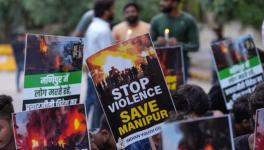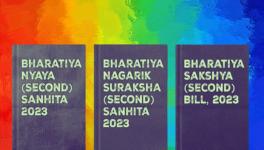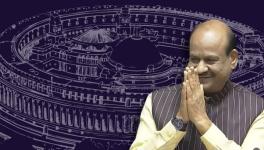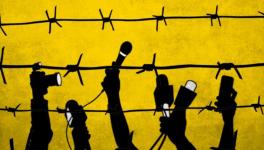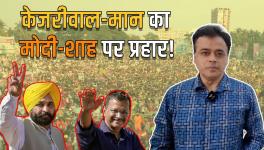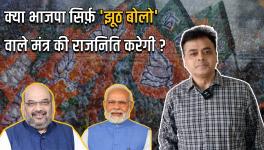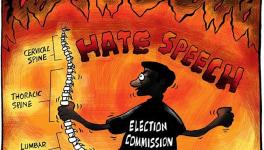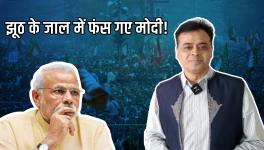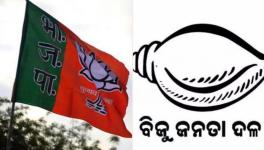MHA 2020 Review: Exemplar of Fabrication and Authoritarian Pride?
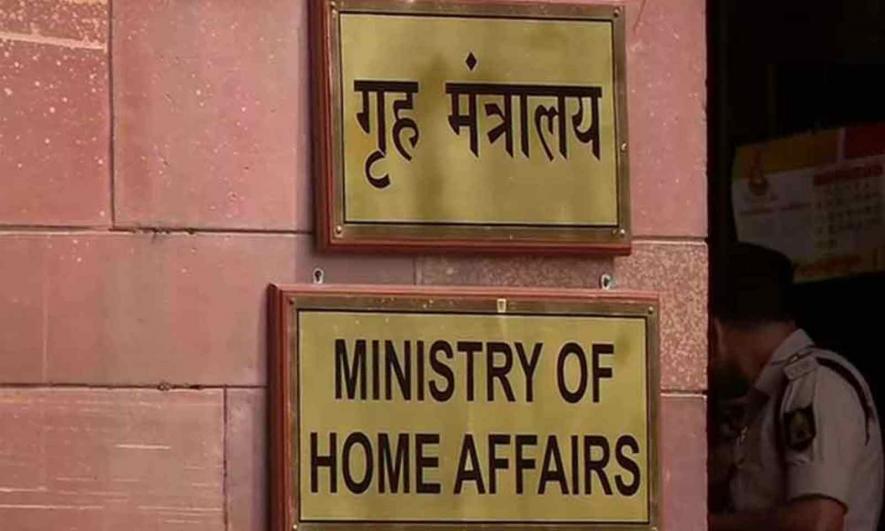
Image Courtesy: The Hans India
On 7 January, the Ministry of Home Affairs (MHA) released its review for 2020. Among routine announcements were self-congratulatory claims mostly involving Amit Shah, who heads it.
As the entire world is now aware, not without some schadenfreude, a mob stormed and infiltrated the Capitol Hill, actively incited by outgoing US President Donald Trump. The day after the violence, euphemistically being called an insurrection, Trump issued a video in which he deplored the incident, promising an orderly transition on 20 January. But on the day, when the rioters stormed Capitol Hill to prevent the final counting of votes and declare Biden the winner, Trump kept encouraging his “base”, with messages such as, “We fight like hell. And if you don’t fight like hell, you’re not going to have a country anymore.”
After the “insurrection” had been quelled, the counting resumed and Biden’s victory was confirmed in the early hours of 7 January inducing an element of synchronicity with New Delhi. On 6 January, however, as attempts were being made to control the situation, Trump claimed it was he who had mobilised the National Guards to assist operations. It soon transpired, however, that Trump had fiddled, whilst Vice-President Mike Pence had signed off on the order.
This excursus into the events in Washington, Trump’s incitement to violence and his claims to being the man of the moment are closely related prima facie to the year-end review of the Ministry of Home Affairs. Almost a full page (pp. 6-7) of the 19-page document highlights Shah’s handling of the northeast Delhi riots, which began on 23 February 2020 and lasted about a week. Whilst the bureaucratese tends to obfuscate, as always, the claims are farcical. Thus, the document claims, under the title, “Delhi Riots—Home Minister steps in”, that Shah chaired a meeting of parties and officials on 25 February, when the mayhem was in full swing, at which he urged the parties “to avoid provocative speeches and statements which could flare up the communal violence”, claiming the violence had been spontaneous. The report also claims that he directed deployment of additional forces, though anything done on the ground was by National Security Advisor Ajit Doval. Shah was missing in action.
On 12 March, responding to a discussion in the Rajya Sabha, Shah expressed grief over the loss of life and property; reassured the country that the perpetrators would be punished, regardless of caste, creed, political affiliation, blah, blah; loss of property would be recovered from the vandals; many social media platforms created just before the riots had been shut down; instigators would be punished; and requested political parties to allay people’s fears.
If these statements have the ring of the run-of-the-mill, Shah made another statement, which despite chiming with the Sangh parivar orthodoxy, was gob-smacking: Vested interests were “misguiding and instilling a fear in Indian Muslims that CAA (the Citizenship (Amendment) Act, 2019) would take away their citizenship” and “hate speeches delivered in the last two months were the main reason behind anti-CAA protests culminating into Delhi riots”.
All these statements were not unlike Trump claiming to have brought the situation in Washington under control after having instigated mayhem. Here’s why. First, asking parties to desist from making provocative speeches that could create violence on the third day of the riots, when it was precisely the statements of leaders of his party, especially Kapil Mishra, which had set the riots off was disingenuous. This even more so given the incendiary rhetoric employed by Bharatiya Janata Party (BJP) leaders during the preceding Delhi election campaign, which included an incitement to murder by, among others, Union Minister for State for Finance Anurag Singh Thakur. Shah’s campaign rhetoric was incendiary as well, helping prepare the ground for what followed. On 27 January 2020, he had urged voters to press voting buttons with such anger that the “current” would be felt in Shaheen Bagh, the celebrated site of peaceful anti-CAA protests. Thus, swirl questions around the semantics of spontaneity.
Second, the issue of deploying additional forces remains moot, since it is documented that many Delhi Police personnel stood by, watching Hindutva storm troopers kill Muslims and pillage their property, when not actually participating in the rampage.
Third comes the reassurance that the perpetrators and instigators of the riots will be punished. In the investigations pursued and actions taken by the Delhi Police, itself indicted for its complicity, almost a year on, few of the actual criminals, the Hindutva brigade, have been proceeded against. Mishra, who must count as the prime instigator, is at large. On the contrary, under the orders of the MHA, the Delhi Police have been pursuing a policy of acting against the victims of the riots—Muslims and anti-CAA protestors, again largely, though not exclusively, Muslims. Muslim youth have been summarily jailed in the midst of the Covid-19 pandemic. Anti-CAA protesters, including a pregnant woman (now freed on bail), have been incarcerated in droves, on draconian and trumped-up charges.
The two officers leading the investigations enjoy not a scintilla of credibility, with one having been censured by the Election Commission and both leading partisan “investigations” in favour of the BJP and its affiliates in the cases relating to violence and police brutality in Jamia Milia Islamia and Jawaharlal Nehru University in December 2019 and January 2020. So much for the rule of law, which in India is defined by Prime Minister Narendra Modi and Shah in accordance with what suits the BJP and its affiliates.
Finally, the CAA. The claims made are complete fabrications—pronounced in the Upper Chamber by the Union home minister. The anti-CAA protests were largely peaceful, led for the most part by students and citizens, many apolitical and participating in public demonstrations for the first time in their lives, as with many Muslim homemakers and aged folks. There is practically no evidence of hate speeches having been delivered, unless you so characterise speeches excoriating the current obscurantist, majoritarian and toxic regime, and the party that runs it, for passing an unconstitutional law. These critical speeches were well within what normal people understand as being legitimate dissent in a democracy.
The anti-CAA protests had no role to play in provoking the Delhi riots. In fact, these peaceful demonstrations were used as a pretext by men like Mishra, a trounced Delhi Assembly election candidate, to foment the riots. That is the reality.
The 2020 report in respect of the Delhi riots is a tissue of lies. There are other misrepresentations of the truth, for instance, with respect of the Centre’s handling of the Covid-19 pandemic and reading down of Article 370, especially in connection with the treatment of migrant workers. But for now, as a footnote to the issue of the rule of law with regard to the investigation of the violence, another incident must be mentioned, which seems not to have found a place in the MHA review. On 24 December, Delhi Police raided the offices of Mehmood Pracha, a lawyer representing victims of the riots, and seized computers and other digital devices. Several lawyers’ associations—the Bar Association of India, the Bar Council of India and the Supreme Court Bar Association—unequivocally condemned the raid, especially on the ground that it would contravene the confidential relation between a client and a lawyer.
It is possible that the MHA forgot to mention this episode in its list of achievements that have for the past six years and counting enabled authoritarian rule and the subversion of institutions and constitutional processes. As a report card, the review is instructive both in the pride it takes in its ongoing dismantling of democracy and its unabashed economy with the truth.
The author is an independent journalist and researcher. The views are personal.
Get the latest reports & analysis with people's perspective on Protests, movements & deep analytical videos, discussions of the current affairs in your Telegram app. Subscribe to NewsClick's Telegram channel & get Real-Time updates on stories, as they get published on our website.









